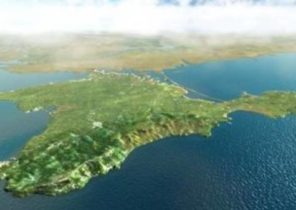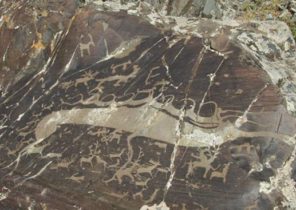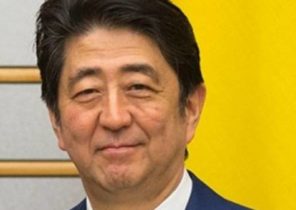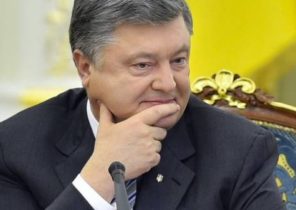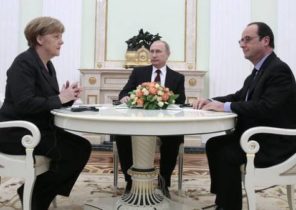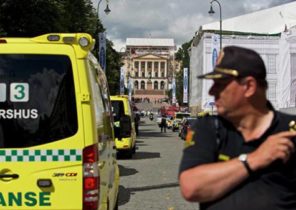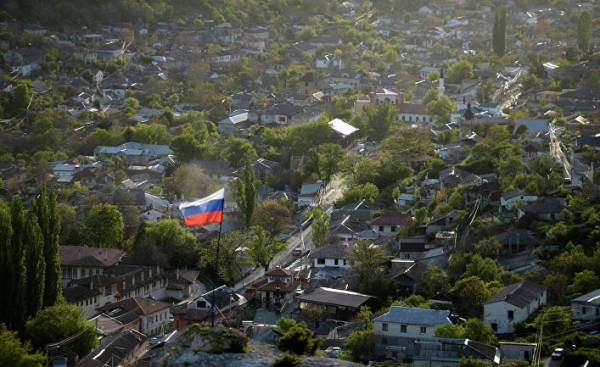
The so-called Crimean crisis began in Ukraine in late 2013 led to the fact that the cooperation between Russia and Europe sharply stopped. The West and the United States accused Russia of the annexation of the Crimea, and from the moment photos of Russian President Vladimir Putin adorned the front pages of Norwegian Newspapers for many months. The titles of the materials pointed to the fact that Putin is a new dictator who will gradually restore the Russian Empire. Our Western media propaganda influencing the population for nearly four years, managed to get many to experience real fear in connection with a possible Russian invasion of Norway.
The commander of the Combined armed forces of NATO in Europe, us General Curtis, Scaparrotti, explained in the Senate in April 2016, which is against Russia “it is impossible to exclude any variants”. There’s a military solution too. On the official NATO website lists the arguments that must justify and defend the massive arms build-up of NATO along the borders with Russia. In order to avoid one-sided information, it is necessary to seek a more nuanced picture.
Interviews with the Crimean Tatars. In October last year, we had the opportunity to go to the Crimean Peninsula, together with a German delegation. The delegation consisted of 13 people: businessmen, politicians, and the head of one of the organization of culture. The invitation came from the “German national-cultural autonomy of the Republic of Crimea” and the Russian government. The head of the Society of Germans of Crimea Yuri HEMPEL himself is the Deputy of local legislative Assembly in Simferopol and a member of the ruling party “United Russia”, he of course has excellent contacts with the government in the Crimea and the government in Moscow.
To go on this trip, which Ukraine regards as illegal stay on their territory, they made us three questions, the answers to which would like to receive: 1) Enough objectively we, the citizens of Norway, informed? 2) Why more than 90% of voted for reunification with Russia? 3) is it suppressed and persecuted national minority, as claimed by some media?
For seven days we have experienced a kaleidoscope of events: from the field of culture — tour of Sevastopol, a visit to the many sites and burials of the world war II, the inspection of tourist attractions such as swallow’s nest in Yalta, and also from politics: we met with members of government and diplomats. When we were preparing for the trip, we were able to Express their wishes about what we would like to see, and with whom I would like to talk. Some members of the delegation, including us, wanted in particular to talk to representatives of national minorities such as Crimean Tatars, who in our media are portrayed as oppressed in the Crimean Peninsula people.
We visited Evpatoria, and the next day, at the cultural center of the Crimean Tatars in Bakhchisarai was able to talk with ordinary people — and in cafes, and in the Armenian restaurant where you had dinner. Most of the interviewees said that they are happy that Crimea reunited with Russia. Crimean Tatars were pleased that the Russian Federation has allocated money for capital repairs of old buildings that the new program provides land all the Tatars who returned to the Peninsula after their ancestors were driven out under Stalin.
Even in the Ukrainian restaurant and in conversations with people on the streets of Sevastopol, we heard that all agree with the fact that Crimea became Russian. Many feared the possible consequences of the activities of right-wing extremist government in Kiev if President Putin did not approve reunification with Russia.
Restaurant owners and the people with whom we spoke in the streets, proudly told me that the Peninsula is now eating vegetables and fruits of local production. After the EU and Norway have imposed sanctions, agriculture began to develop at a rapid pace, dairy farming, poultry farming and agriculture whose products meet the highest quality standards, invested large sums of money.
The wrong idea. Ministers and deputies of the State Duma in Moscow, with whom we met, spoke openly about the fact that Crimea has always been Russian, and that Ukraine will not return. Moscow could accept Ukraine’s neutrality, but not its membership in NATO. Of course, annexation is the wrong term, since we are talking about secession or independence, which is legitimate due to a national referendum.
International law is also not violated because the speech about access to it, nor does it prohibit secession, as it would limit the right of peoples to self-determination.
The trip to the Peninsula gave us some answers. Now we understand the situation in Crimea is much better. Our conclusion is that the media in Norway, we objective information, not receive. Most so-called experts voicing their opinion, one way or another, are influenced. The vast majority of Crimean residents voted for the inclusion of the Russian Federation, guided by their feelings and strong ties with Russia. The pride and joy associated with getting a Russian passport and Russian car numbers, big and is visible everywhere.
Representatives of national minorities with whom we spoke were pleased with the positive changes as regards the recognition of their cultural heritage. Official investments in buildings, mosques and infrastructure show the public that they and their culture are welcomed, or, at least, are recognized as part of the Crimea. We have not seen any Russian soldiers or extras, expressing enthusiasm about Putin.
Understanding. The question is how we in Norway refer to Russia in the future. We directly border with Russia, many years traded with each other, Russia has suffered the biggest losses in the liberation of Europe from Nazism, without receiving in return the same gratitude that England or the United States. What we expect from Russia? In Norway we are living in a democracy is more than 70 years, showing the finger to the country that shifted from one mode to another and free only 25 years. Do we really need to show a bit more patience towards Russia, its wishes and views? Is it in our Norwegian interests to exclude Russia from everywhere, to cancel the trade and investment projects and build large-scale NATO forces, which seems nothing but an open provocation?
The expression “Putin’s friend” is abusive, and it says about how far we’ve come. Is in order to discuss the existing differences, it is not necessary first to understand the other?
